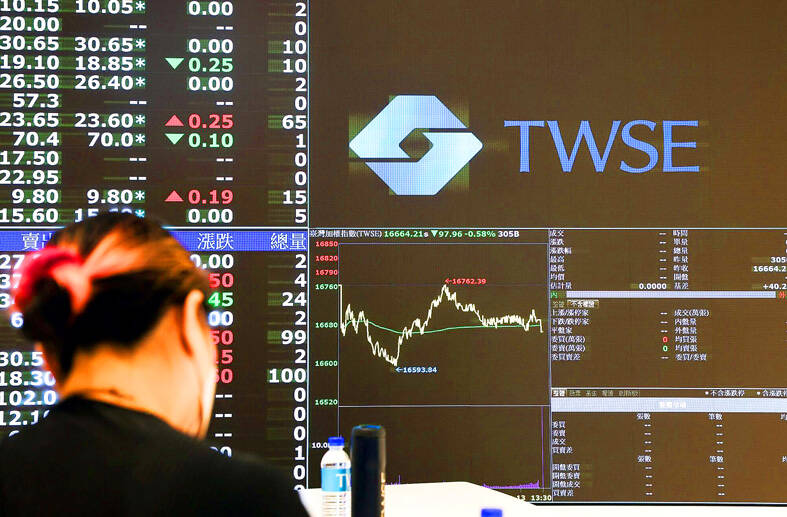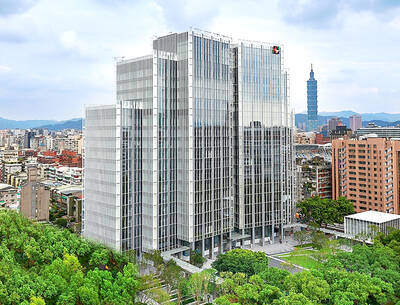Companies listed on the Taiwan Stock Exchange (TWSE) posted a year-on-year decline of more than 8 percent in combined sales last month as the transportation, steel, and oil, gas and electricity industries saw revenue move lower on weakening demand in the month, the exchange said on Friday.
Data compiled by the TWSE showed combined sales posted by 981 companies listed on the main board totaled NT$3.04 trillion (US$95.6 billion), down NT$269.7 billion or 8.14 percent from a year earlier.
Among the 981 listed companies, 382 registered an increase in sales, while 599 reported a decline in revenue, the data indicated.

Photo: Bloomberg
The transportation industry, which includes major container cargo shippers, generated NT$98.9 billion in aggregate sales, down 41.51 percent from a year earlier, the steepest decline among the major industries on the main board, at a time when high inflation worldwide affected global demand for cargo shipping.
In the oil, gas and electricity industry, which suffered the second-steepest fall in revenue, combined sales fell 28.61 percent from a year earlier to NT$57.9 billion.
The exchange said the downturn in the oil, gas and electricity industry largely reflected a decline in international crude oil prices in the month.
The steel industry felt the pinch resulting from a fall in product prices and saw sales fall 17.88 percent from a year earlier to NT$69.8 billion, the third-steepest decline, according to the exchange.
Bucking the downturn, the tourism, food and beverage industry benefited from eased border controls, posting NT$9.0 billion in sales, up 52.54 percent from a year earlier.
The building materials and construction industry came in second after registering a 25.55 percent increase in sales to NT$34.4 billion as many companies booked revenue from completed construction projects in the month, the exchange said.
The financial and insurance industry reported the third-highest growth in sales, rising 19.08 percent from a year earlier to NT$200.3 billion on the back of an increase in investment returns.
In the first seven months of this year, the 981 listed companies posted NT$20.37 trillion in sales, down 11.68 percent from a year earlier, with 335 reporting an increase and 646 registering a decline, the data showed.
The transportation industry suffered the steepest year-on-year decline of 42.76 percent in sales, which totaled NT $653.9 billion in the seven- month period, while the tourism, food and beverage industry reported the highest growth of 53.17 percent in revenue, which hit NT$55.6 billion, the exchange’s data showed.

Alchip Technologies Ltd (世芯), an application-specific integrated circuit (ASIC) designer specializing in artificial-intelligence (AI) chips, yesterday said that small-volume production of 3-nanometer (nm) chips for a key customer is on track to start by the end of this year, dismissing speculation about delays in producing advanced chips. As Alchip is transitioning from 7-nanometer and 5-nanometer process technology to 3 nanometers, investors and shareholders have been closely monitoring whether the company is navigating through such transition smoothly. “We are proceeding well in [building] this generation [of chips]. It appears to me that no revision will be required. We have achieved success in designing

UNCERTAINTY: Investors remain worried that trade negotiations with Washington could go poorly, given Trump’s inconsistency on tariffs in his second term, experts said The consumer confidence index this month fell for a ninth consecutive month to its lowest level in 13 months, as global trade uncertainties and tariff risks cloud Taiwan’s economic outlook, a survey released yesterday by National Central University found. The biggest decline came from the timing for stock investments, which plunged 11.82 points to 26.82, underscoring bleak investor confidence, it said. “Although the TAIEX reclaimed the 21,000-point mark after the US and China agreed to bury the hatchet for 90 days, investors remain worried that the situation would turn sour later,” said Dachrahn Wu (吳大任), director of the university’s Research Center for

GROWING CONCERN: Some senior Trump administration officials opposed the UAE expansion over fears that another TSMC project could jeopardize its US investment Taiwan Semiconductor Manufacturing Co (TSMC, 台積電) is evaluating building an advanced production facility in the United Arab Emirates (UAE) and has discussed the possibility with officials in US President Donald Trump’s administration, people familiar with the matter said, in a potentially major bet on the Middle East that would only come to fruition with Washington’s approval. The company has had multiple meetings in the past few months with US Special Envoy to the Middle East Steve Witkoff and officials from MGX, an influential investment vehicle overseen by the UAE president’s brother, the people said. The conversations are a continuation of talks that

PROJECTION: KGI Financial said that based on its foreign exchange exposure, a NT$0.1 increase in the New Taiwan dollar would negatively impact it by about NT$1.7 billion KGI Financial Holding Co (凱基金控) yesterday said its life insurance arm has increased hedging and adopted other moves to curb the impact of the local currency’s appreciation on its profitability. “It is difficult to accurately depict the hedging costs, which might vary from 7 percent to 40 percent in a single day,” KGI Life Insurance Co (凱基人壽) told an investors’ conference in Taipei. KGI Life, which underpinned 66 percent of the group’s total net income last year, has elevated hedging to 55 to 60 percent, while using a basket of currencies to manage currency volatility, the insurer said. As different